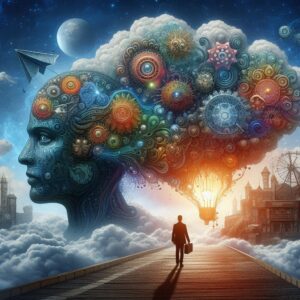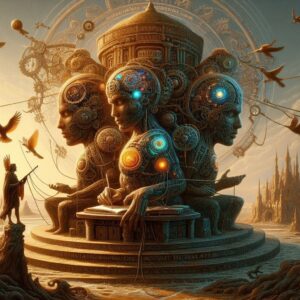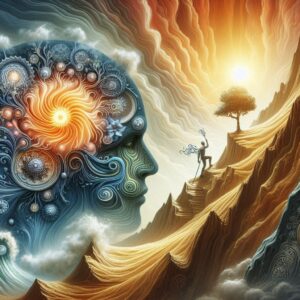Imagination is one of the key elements in intuition development. Unlike artificial intelligence (AI), humans have the ability to dream, imagine, and even feel emotions related to these dreams. Imagination allows us to navigate the unseen, visualize possibilities, and anticipate potential outcomes. But why is this ability so crucial for intuition, and how can we harness it to make better decisions—especially in times of uncertainty or crisis?

The Role of Imagination in Intuition Development
Imagination plays a central role in shaping our intuition. It is through imagination that we can create mental models of potential situations, solve problems creatively, and envision new paths forward. This is particularly true in areas such as leadership and mental health, where the ability to anticipate challenges, understand other people’s emotions, and innovate solutions is paramount.

1. Dreaming and Fearing: Emotional Drivers of Imagination
Dreams often arise from our desires to feel better or from the need to escape certain fears. They give us a mental space to explore scenarios, both positive and negative. These imagined situations help us evaluate potential outcomes, test various strategies, and ultimately develop intuitive insights based on the mental scenarios we’ve created.
Fears, on the other hand, are deeply emotional drivers that influence our ability to imagine the worst-case scenarios. These emotions are not just negative; they can also motivate us to take precautionary actions or push us toward innovation when confronted with adversity. Together, dreams and fears contribute to a balanced intuitive understanding.

2. Neural Networks and Human Imagination
While neural networks and artificial intelligence can generate creative content, they lack the inherent emotional experience that drives human imagination. AI may be able to create something new by analyzing past data, but it cannot direct its imagination because it lacks the emotion or necessity that human beings feel. Humans are driven by emotions—hopes, fears, and desires—and these emotions provide the fuel for our imaginative processes.
Unlike AI, which simply processes data, humans use emotional drivers to direct their imagination. We don’t just imagine randomly; our emotions help us focus our creativity on what matters most. Whether it’s a fear of failure or a desire for success, our emotional intelligence allows us to calibrate our imagination toward realistic and practical goals.
3. Emotional Intelligence and Imagination Calibration
Emotional intelligence (EI) is the ability to understand and manage our emotions, and to use this emotional awareness to guide our thinking and behavior. When it comes to intuition development, EI plays a crucial role in calibrating our imagination. By understanding our emotional triggers, we can focus our imagination on constructive and productive solutions, rather than being lost in unfounded fears or unrealistic fantasies.
Emotional intelligence allows us to use our emotions as a guide for imaginative thinking. For example, empathy can help us understand the emotional states of others, providing us with the necessary insights to craft solutions that address both practical and emotional needs. Self-awareness helps us recognize when our fears are limiting our creativity, and self-regulation enables us to focus our imagination on solutions that benefit both ourselves and others.
Why Does Imagination Matter for Intuition Development?
Imagination is essential for developing intuition because it allows us to think outside the box and foresee scenarios that haven’t happened yet. For leaders and individuals in high-stress environments, the ability to predict potential challenges and visualize solutions is invaluable. Intuition is not just based on experience—it’s about using creative thinking to anticipate the future and prepare for what’s next.
For example, in leadership roles, a well-developed sense of intuition can help in navigating conflict, crisis management, and empathy-driven decision-making. Similarly, in mental health, the ability to imagine different perspectives and outcomes can help individuals manage stress, cope with anxiety, and make thoughtful decisions about their well-being.
What Can Go Wrong in Using Imagination for Intuition Development?
Imagination, while powerful, can also go astray. Without the proper emotional intelligence, it can lead to irrational or unrealistic conclusions.
1. Overactive Imagination
Sometimes, individuals allow their fears or anxieties to fuel an overactive imagination. This can lead to overthinking, paranoia, or making decisions based on worst-case scenarios that aren’t necessarily realistic. Leaders, in particular, must balance imaginative thinking with practicality, ensuring that they do not get lost in fantasies or fears that hinder their ability to act effectively.
2. Lack of Emotional Awareness
If individuals are not aware of their emotional states, they might direct their imagination in unproductive directions. For instance, fear of failure can lead to avoidance, while uncontrolled optimism can result in ignoring potential risks. Without emotional self-regulation, imagination can run wild, distorting reality and impeding intuitive decision-making.
3. Imbalance Between Experience and Imagination
While imagination is important, it needs to be grounded in real-world experience. Intuition is most powerful when it combines experience with imagination—enabling individuals to generate ideas that are both creative and actionable. A lack of practical experience can cause imagination to become detached from reality, resulting in decisions that are more idealistic than achievable.
How Can We Use Imagination to Enhance Intuition?
1. Fostering Emotional Intelligence
The key to directing imagination effectively lies in developing emotional intelligence. By becoming more aware of our emotions, we can guide our imagination toward practical, creative solutions. For example, if we recognize fear as a driving force, we can reframe it as a motivation for innovation, not avoidance. Empathy also helps in understanding others’ emotional states, enriching our imaginative processes.
2. Balancing Imagination with Practical Experience
While imagination can open up new possibilities, it needs to be checked against real-world experience. By combining both, we ensure that the intuitive knowledge we develop is grounded in reality and applicable to actual situations. This balance is especially important for leadership, where decisions need to be both visionary and practical.
3. Developing Mindfulness Practices
Mindfulness practices, such as meditation, can help calm the mind and enable us to focus our imagination in a positive and productive direction. By regularly practicing mindfulness, we can learn to separate productive creativity from anxiety-driven thoughts, allowing imagination to become a powerful tool for intuition.
Conclusion: The Power of Imagination in Intuition Development
Imagination is a fundamental component of intuition development. By directing our imagination through the lens of emotional intelligence, we can create new possibilities, anticipate future challenges, and make better decisions. In both mental health and leadership, the ability to imagine scenarios and solutions is essential for growth and resilience.
However, overactive imagination or lack of emotional awareness can distort intuition, so it’s important to maintain a balanced, grounded approach. By fostering emotional intelligence, we can calibrate our imagination, guiding it toward useful, intuitive knowledge that enhances our ability to navigate the complexities of life and leadership.



